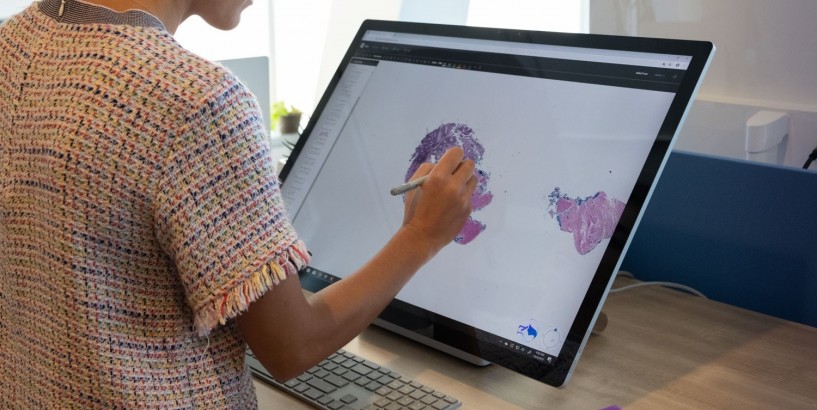For artificial intelligence (AI) to be truly effective it needs data—and lots of it, and Paige might have more access to cancer pathology data than any other company. Paige spun out of Memorial Sloan Kettering Cancer Center (MSKCC) where its co-founder, Prof. Thomas Fuchs, led ground-breaking research in computational pathology. When the original founders decided to branch out in 2017, they left with an exclusive deal to use MSKCC’s library of 25 million pathology slides—one of the largest tumor pathology archives.
Since then, they have been working to digitize about 100,000 new slides per month and to pair that data with anonymized clinical data to develop large-scale machine learning algorithms in order to detect new connections between pathology, genomics, treatment response, and patient outcomes. In February 2019, the company welcomed Leo Grady, PhD as its new CEO to apply his expertise in the space to help the company further grow. PM360 spoke with Dr. Grady about his decision to join the company, what its AI is capable of, how Paige can revolutionize drug development, and more.
Leo Grady, PhD, CEO, Paige PM360: What drew you to this company? Dr. Leo Grady: My background is in AI, with a PhD on the subject and I spent my whole career in the healthcare industry. First, I was at Siemens, where I worked on applying AI in radiology. Then I joined HeartFlow, where we built the first computational diagnostic test for coronary disease. I was really excited about what we were doing at HeartFlow but, when I got in touch with the founders of Paige and heard about what they were doing, it seemed like a once in a lifetime opportunity because MSKCC is a leading cancer hospital in the world. The quality and quantity of the data is completely unparalleled, and the Paige founder was a pioneer in the field of computational pathology and the application of AI to pathology. The company was also well-funded, had a tremendous team, and it seemed that the founders wanted to do all of the same things I was working on at HeartFlow, but for cancer and at an even greater scale. All of this together made it feel like an opportunity I couldn’t turn down.
What made this opportunity at Paige so unique since there are several other companies also in this AI-healthcare space? Two things really. One is the data itself. Most of those AI companies are going around begging hospitals for data and Paige has the opposite situation. Paige has been endowed with this incredible data resource. Secondly, because the opportunity for Paige went beyond just trying to automate what doctors were doing or assist their ability to do so. Paige has the opportunity to build new AI-based tests that can be used as new computational biomarkers or companion diagnostics that are not derived from chemistry or sequencing but derived from looking at the tissue structure from a scanned slide. That opportunity is what really blew me away.
What results has the company seen so far in taking the access to the data they received from MSKCC and turning it practical insights or tools? The founder and his team at MSKCC developed some of the early technology even before the creation of Paige and was able to demonstrate near perfect capability to detect prostate cancer, skin cancer, and breast cancer. This technology was tested on 12,000 slides from more than 800 hospitals and published in Nature Medicine . Using this seed technology and building on it, Paige was able to obtain the first breakthrough designation for any AI technology, not only in pathology, but all of oncology for our AI-based module Paige Prostate. Since then we’ve gotten the first CE mark for AI in pathology, which allows the technology to be used clinically in Europe. We’re really just getting started.
At the end of last year, you partnered with Philips to utilize your Paige Prostate module in their digital pathology products. How else are you currently working with or looking to work with other life sciences companies? The partnership with Philips is about the application of clinical pathology in order to better help practicing pathologists. We are also working directly with the biopharma industry to build computational biomarkers and companion diagnostics that can help identify those patients who are going to be more likely to respond to therapies. With that information we can help to design better drugs that are capable of going through clinical trials faster, and ultimately reaching the market faster.
That’s because research now shows that by just looking at pathology slides it’s possible to deduce a variety of genomic mutations without doing sequencing, since the genomic mutations are expressed in the cell growth and tissue patterns. We will soon be able to provide that information quickly, cheaply, and at point of care, without the need to use expensive assays that destroy the tissue—and sometimes produce inconsistent results—by doing those same tests as well as new tests based only on digital images of the slides. Additionally, we are also partnering with other companies in the industry like Invicro, a contract research organization that is focused on the application of running hundreds of clinical trials and being able to offer our pathology technology through them.
What are some of the more future-looking goals of the company? On the clinical side we really want to transform clinical pathology into a digital discipline that provides much greater throughput. We will offer pathologists more standardized quality at a lower cost that enables them much more freedom to collaborate with each other and to return results back to the patients more quickly. We’re also incredibly excited about continuing our work with the biopharma industry. Our initial partnerships have shown the potential of Paige’s technology and we look forward to expanding the field of computational diagnostic testing and computational biomarkers.









